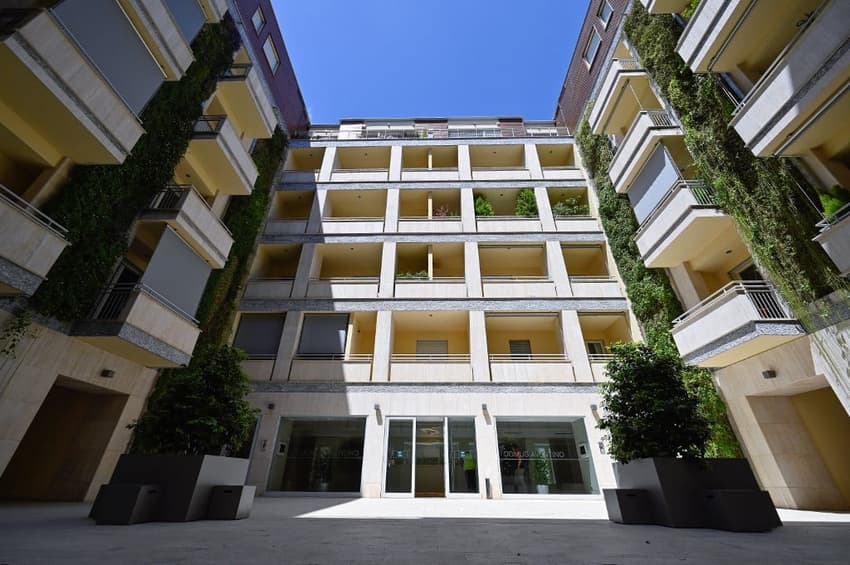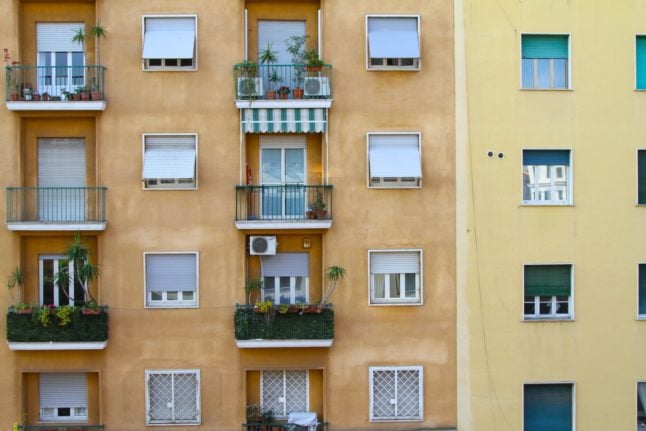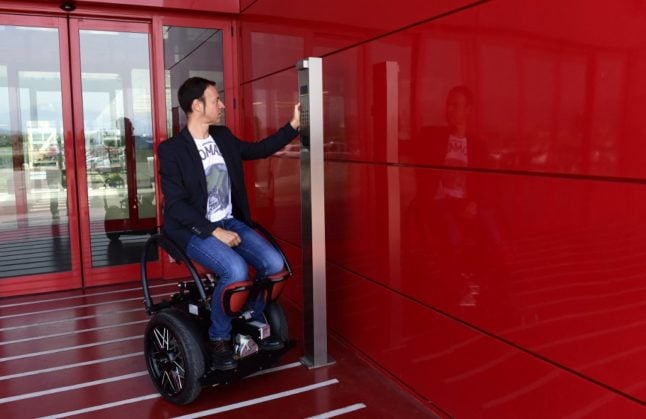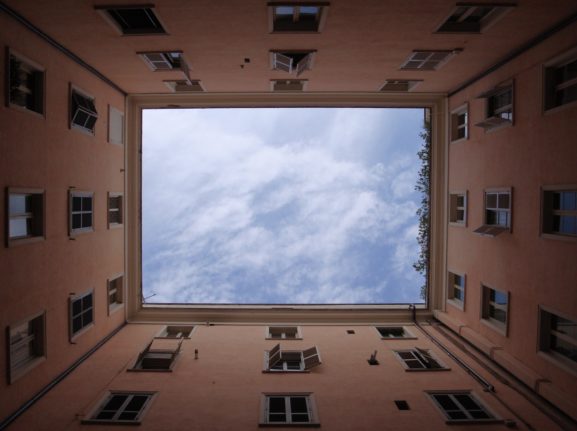EXPLAINED: How to find a longer-term apartment rental in Italy

Ready to move out of your AirBnb? Here's our complete guide to finding a place to call home in Italy.
Looking to move? Find your next rental apartment here.
You’ve arrived in Italy, and you think you might be able to settle down for a while. But there’s one thing you need to do first — find a longer-term place to stay.
Finding a long-term rental in Italy can be daunting, as the process can be very different from finding a place in countries like the US, UK or Canada.
READ ALSO: Why are long-term apartment rentals 'disappearing' in Italy?
Here’s what you need to know before going hunting for the perfect home.
Rental contracts
When you’re ready to move out of short-term housing, it’s worth knowing that Italy’s rental contracts tend to be on the long side.
That’s because they’re designed to protect tenants like you, and ensure you have a place to live for up to eight years at a time.
Generally, most long-term rental contracts fall into just two categories.
The first, 3+2 or 'determined rent' (canone concordato) contracts, are for a minimum of three years, with an automatic option to renew for two more. Rent in these units are set by the municipality, and cannot be negotiated.
The second category is 4+4 or 'negotiated rent' (canone libero). Here the landlord can set the rent at what they want, but must offer a contract for a minimum of four years, with an automatic option to renew for four more.
There are also some shorter-term leases, generally reserved for students and temporary workers — you can read about them in our guide to rental contracts.

Consider which type of rental contract works best for you. Photo by mike nguyen on Unsplash
You will need your codice fiscale to enter into any contract, and may need to prove your income is sufficient or secure a rental guarantee from a major bank. You’ll also need to provide a deposit equal to between one and three month’s rent.
READ ALSO:
- What you need to know about navigating Italian rental contracts
- Can my landlord legally increase my rent in Italy?
- Do renters in Italy have the right to keep pets?
If you’re worried about committing to Italy for three or four years at a time, don’t worry — most rental contracts include a clause that allows you to leave with notice. But be warned, it’s often not the one or two months typical in English-speaking countries. In Italy, anticipate giving at least six months notice before moving on.
These terms, along with your rent, can also be negotiated when you’re closing the deal, which is one reason why you might consider finding your apartment with an agency.
Using an agency
Most Italian towns or regions will have a plethora of agenzie immobiliare that can help you find your future home.
These agencies will do the work of finding and connecting you with potential properties, and negotiate on your behalf for terms that suit your needs.
They also offer a human touch, potentially making the whole process less intimidating. If you have special needs or accommodations, like a dog or a disability, they will screen out the properties that don’t meet your requirements.

Rental agencies can help you find properties that meet specific requirements. Photo by MIGUEL MEDINA / AFP.
And, they may know about some properties before they hit the open market, giving you a leg up on the competition.
But there are downsides, too. Properties let through rental agencies can be more expensive, as the owners must cover the costs of their own fees to the agency.
READ ALSO: How can I find an apartment to rent in Rome?
Rental agencies can also act as gatekeepers, and are notorious for refusing to work with students or recent immigrants, or freezing out prospective tenants they just don’t like the look of.
As a rule, rental agencies will take a commission upon sealing the deal from both the tenant and the owner. That commission is usually equivalent to one or two months rent, but in some cases is calculated as a percentage (usually 10-15 percent) of your total annual rent.
It will also usually be subject to 21 percent VAT, meaning your total cost for a commission on a €800 per month flat could be as high as €1,700 or more.
Since commission is determined partly by local custom, it’s important to ask before beginning your search with an agency what the commission will be.
Searching online
If those fees look a little steep — or if you just want to explore every option — there are an increasing number of real estate rental websites you can investigate.
These sites often offer a mix of properties proposed by rental agencies and those rented by owners. Anecdotally, your success and response rate may vary greatly.

Real estate websites are a key resource when apartment-hunting in Italy. Photo by Caitlin Oriel on Unsplash
The biggest websites include Idealista.it, Immobiliare.it, and Casa.it. All work more or less the same way: select your area, filter by rental cost, number of rooms, and other details, and see what's available.
There are also often rentals posted on the classifieds site Subito.it, and even Facebook Marketplace.
Be wary of scams on any of these sites — never exchange money without visiting the apartment and signing a contract first.
All offer direct messaging systems, but be sure to read the descriptions of properties carefully, as many will encourage you to call or text via WhatsApp instead.
If you do write a message, make sure it is in your best Italian — it will no doubt be read alongside many others and you want to put your best foot forward. Consider reading up on our guide for formal email writing in Italian before diving in.
Terminology to help your search
In Italy, most apartments are listed by the total number of rooms, minus the bathroom. A monolocale (one-room) is a bachelor or studio apartment; a bilocale (two-room) is a one-bedroom.
Kitchens are more often an angolo cottura (kitchenettes) than full separate rooms — but where they are divided, they will not always be included in the room count.
If you don’t want to buy all your furniture, look for apartments that are arredato or furnished. If you opt for an unfurnished apartment, be warned — it may come without even kitchen appliances or light fixtures.

Be prepared for an unfurnished apartment in Italy to be truly bare. Photo by Steven Ungermann on Unsplash
Keep an eye out also for spese condominiali, which are often additional to advertised rent. These are monthly fees to cover common costs like lift maintenance, garbage collection, and central heating. They’re often charged at a flat rate and then reconciled with actual costs a few times a year.
READ ALSO: Ten things to expect when renting an apartment in Italy
Since the energy crisis, many of these fees have been skyrocketing, so when visiting a property, it may be worth asking what the current average cost is when you can.
Prepare for a long search
Once you begin your search, you may be looking for a while. Make sure to prepare for at least a few months of searching.
Recently, data has shown a massive drop in the availability of long-term rentals in many major centers. Landlords have little appetite to find tenants when they’re locking in rents during a time of soaring inflation.
Consider also that in many university towns, there are shortages of housing around the beginning of each semester. If you can time your search to fall between these periods, you may have a better chance of success.
Comments
See Also
You’ve arrived in Italy, and you think you might be able to settle down for a while. But there’s one thing you need to do first — find a longer-term place to stay.
Finding a long-term rental in Italy can be daunting, as the process can be very different from finding a place in countries like the US, UK or Canada.
READ ALSO: Why are long-term apartment rentals 'disappearing' in Italy?
Here’s what you need to know before going hunting for the perfect home.
Rental contracts
When you’re ready to move out of short-term housing, it’s worth knowing that Italy’s rental contracts tend to be on the long side.
That’s because they’re designed to protect tenants like you, and ensure you have a place to live for up to eight years at a time.
Generally, most long-term rental contracts fall into just two categories.
The first, 3+2 or 'determined rent' (canone concordato) contracts, are for a minimum of three years, with an automatic option to renew for two more. Rent in these units are set by the municipality, and cannot be negotiated.
The second category is 4+4 or 'negotiated rent' (canone libero). Here the landlord can set the rent at what they want, but must offer a contract for a minimum of four years, with an automatic option to renew for four more.
There are also some shorter-term leases, generally reserved for students and temporary workers — you can read about them in our guide to rental contracts.

You will need your codice fiscale to enter into any contract, and may need to prove your income is sufficient or secure a rental guarantee from a major bank. You’ll also need to provide a deposit equal to between one and three month’s rent.
READ ALSO:
- What you need to know about navigating Italian rental contracts
- Can my landlord legally increase my rent in Italy?
- Do renters in Italy have the right to keep pets?
If you’re worried about committing to Italy for three or four years at a time, don’t worry — most rental contracts include a clause that allows you to leave with notice. But be warned, it’s often not the one or two months typical in English-speaking countries. In Italy, anticipate giving at least six months notice before moving on.
These terms, along with your rent, can also be negotiated when you’re closing the deal, which is one reason why you might consider finding your apartment with an agency.
Using an agency
Most Italian towns or regions will have a plethora of agenzie immobiliare that can help you find your future home.
These agencies will do the work of finding and connecting you with potential properties, and negotiate on your behalf for terms that suit your needs.
They also offer a human touch, potentially making the whole process less intimidating. If you have special needs or accommodations, like a dog or a disability, they will screen out the properties that don’t meet your requirements.

And, they may know about some properties before they hit the open market, giving you a leg up on the competition.
But there are downsides, too. Properties let through rental agencies can be more expensive, as the owners must cover the costs of their own fees to the agency.
READ ALSO: How can I find an apartment to rent in Rome?
Rental agencies can also act as gatekeepers, and are notorious for refusing to work with students or recent immigrants, or freezing out prospective tenants they just don’t like the look of.
As a rule, rental agencies will take a commission upon sealing the deal from both the tenant and the owner. That commission is usually equivalent to one or two months rent, but in some cases is calculated as a percentage (usually 10-15 percent) of your total annual rent.
It will also usually be subject to 21 percent VAT, meaning your total cost for a commission on a €800 per month flat could be as high as €1,700 or more.
Since commission is determined partly by local custom, it’s important to ask before beginning your search with an agency what the commission will be.
Searching online
If those fees look a little steep — or if you just want to explore every option — there are an increasing number of real estate rental websites you can investigate.
These sites often offer a mix of properties proposed by rental agencies and those rented by owners. Anecdotally, your success and response rate may vary greatly.

The biggest websites include Idealista.it, Immobiliare.it, and Casa.it. All work more or less the same way: select your area, filter by rental cost, number of rooms, and other details, and see what's available.
There are also often rentals posted on the classifieds site Subito.it, and even Facebook Marketplace.
Be wary of scams on any of these sites — never exchange money without visiting the apartment and signing a contract first.
All offer direct messaging systems, but be sure to read the descriptions of properties carefully, as many will encourage you to call or text via WhatsApp instead.
If you do write a message, make sure it is in your best Italian — it will no doubt be read alongside many others and you want to put your best foot forward. Consider reading up on our guide for formal email writing in Italian before diving in.
Terminology to help your search
In Italy, most apartments are listed by the total number of rooms, minus the bathroom. A monolocale (one-room) is a bachelor or studio apartment; a bilocale (two-room) is a one-bedroom.
Kitchens are more often an angolo cottura (kitchenettes) than full separate rooms — but where they are divided, they will not always be included in the room count.
If you don’t want to buy all your furniture, look for apartments that are arredato or furnished. If you opt for an unfurnished apartment, be warned — it may come without even kitchen appliances or light fixtures.

Keep an eye out also for spese condominiali, which are often additional to advertised rent. These are monthly fees to cover common costs like lift maintenance, garbage collection, and central heating. They’re often charged at a flat rate and then reconciled with actual costs a few times a year.
READ ALSO: Ten things to expect when renting an apartment in Italy
Since the energy crisis, many of these fees have been skyrocketing, so when visiting a property, it may be worth asking what the current average cost is when you can.
Prepare for a long search
Once you begin your search, you may be looking for a while. Make sure to prepare for at least a few months of searching.
Recently, data has shown a massive drop in the availability of long-term rentals in many major centers. Landlords have little appetite to find tenants when they’re locking in rents during a time of soaring inflation.
Consider also that in many university towns, there are shortages of housing around the beginning of each semester. If you can time your search to fall between these periods, you may have a better chance of success.
Join the conversation in our comments section below. Share your own views and experience and if you have a question or suggestion for our journalists then email us at [email protected].
Please keep comments civil, constructive and on topic – and make sure to read our terms of use before getting involved.
Please log in here to leave a comment.